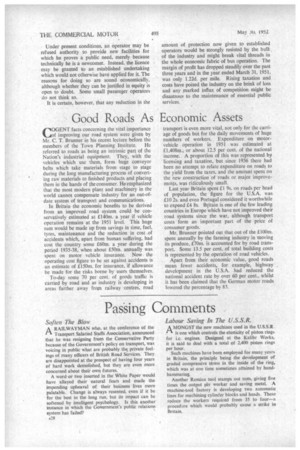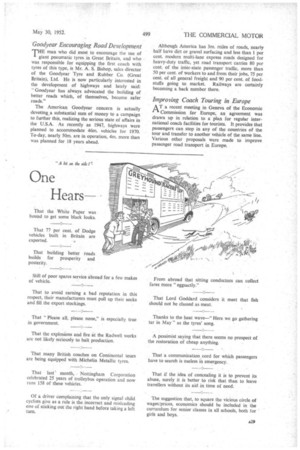Pas . sing Comments
Page 30

Page 31

If you've noticed an error in this article please click here to report it so we can fix it.
Soften the Blow
A RAILWAYMAN who, at the conference of the 1". Transport Salaried Staffs Association, announced that he was resigning from the Conservative Party because of the Government's policy on transport, was voicing in public what are probably the private feelings of many officers of British Road Services. They are disappointed at the prospect of having four years of hard work demolished, but they are even more concerned about their own futures.
A word or two inserted in the White Paper would have allayed their natural fears and made the impending upheaval of their business lives more palatable. Change is always resented, even if it be for the best in the long run, but its impact can be softened by intelligent psychology. Is this another instance in which the Government's public relations system has failed?
A28
Labour Saving In The U.S.S.R.
AMONGST the new machines used in the U.S.S.R. is one which controls the elasticity of piston rings for i.e. engines. Designed at the Kalibr Works, it is said to deal with a total of 2,400 piston rings per hour.
Such machines have been employed for many years in Britain, the principle being the development of graded compressive stress in the inside of the ring, which was at one time sometimes attained by handhammering.
Another Russian tool stamps out nuts, giving five times the output per worker and saving metal. A machine-tool factory is developing two automatic lines for machining cylinder blocks and heads. These reduce the workers required from 35 to four—a procedure which would probably cause a strike in Britain.
'Goodyear Encouraging Road Development
THE man who did most to encourage the use of giant pneumatic tyres in Great Britain, and who was responsible for equipping the first coach with tyres of this type, is Mr. A. S. Bishop, sales director of the Goodyear Tyre and Rubber Co. (Great Britain), Ltd. He is now particularly interested in the development of highways and lately said: Goodyear has always advocated the building of better roads which, of themselves, become safer roads."
The American Goodyear concern is actually devoting a substantial sum of money to a campaign to further this, realizing the serious state of affairs in the U.S.A. As recently as 1947, highways were planned to accommodate 46m. vehicles for 1970. To-day, nearly 50m. are in operation, 4m. more than was planned for 18 years ahead. Although America has 3m. miles of roads, nearly half have dirt or gravel surfacing and less than 1 per cent. modern multi-lane express roads designed for heavy-duty traffic, yet road transport Carries 80 per cent. of the inter-state passenger traffic, more than 50 per cent. of workers to and from their jobs, 75 per cent. of all general freight and 90 per cent, of foodstuffs going to market. Railways are certainly becoming a back number there.
Improving Coach Touring in Europe
AT a recent meeting in Geneva of the Economic Commission for Europe, an agreement was drawn up in relation to a plan for regular international coach facilities for tourists. It provides that passengers can stop in any of the countries of the tour and transfer to another vehicle of the same line. Various other proposals were made to improve passenger road transport in Europe.




























































































